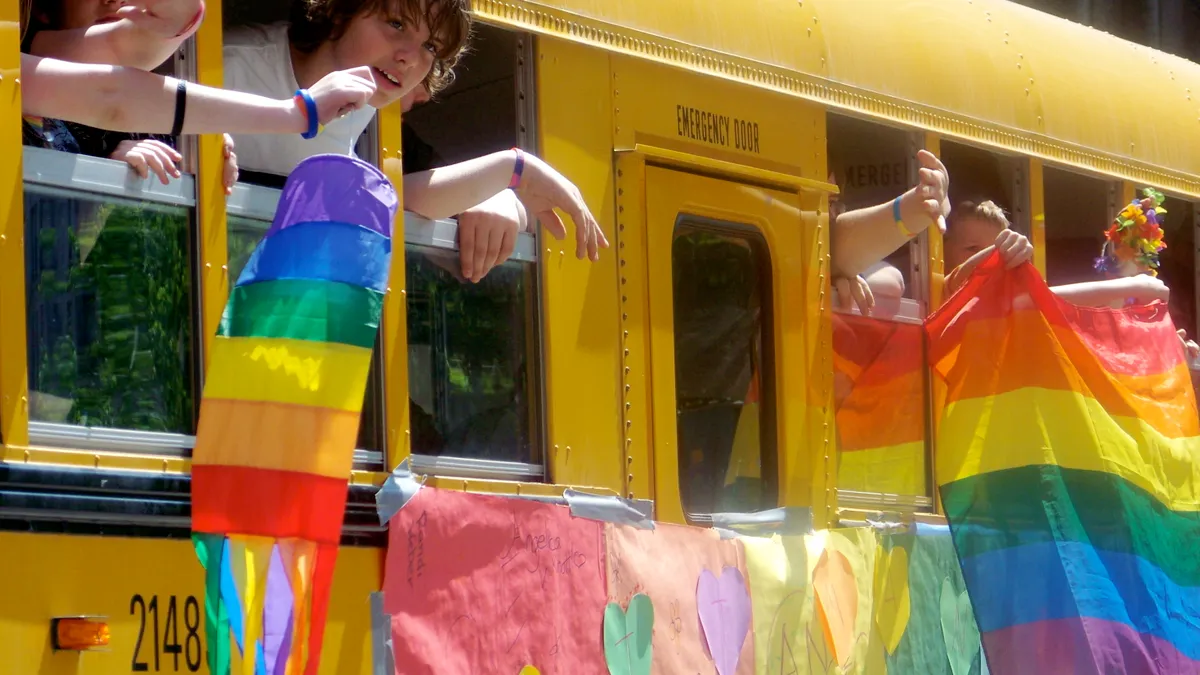Dive Brief:
-
Nearly two-thirds of LGBTQ youth could not get the mental health counseling they sought in the past year, up from just under half the year before, according to The Trevor Project’s annual National Survey on LGBTQ Youth Mental Health.
-
This increase, from 48% in 2021 to 60% in 2022, comes despite a majority of schools offering in-person learning and mental health services this school year. It also comes after 70% of LGBTQ youth stated last year that their mental health was "poor" most of the time or always during COVID-19 — a percentage that improved to 56% this year.
-
LGBTQ students who found their schools to be supportive of their identity were less likely to attempt suicide, according to the report. However, while 55% of LGBTQ youth found their school to be affirming, nearly 4 in 10 LGBTQ youth reported living in a community that is somewhat or very unaccepting of LGBTQ people.
Dive Insight:
Students cited multiple barriers to accessing mental healthcare in schools, the top three being fear of discussing mental health, concerns with obtaining parent or guardian permission, and worry of not being taken seriously. A total of 33,993 LGBTQ youth ages 13-24 were included in the national survey results.
"These factors reinforce the notion that the most critical and overwhelming barrier that is preventing LGBTQ young people from accessing the care they need is the stigma that surrounds issues of mental health," said Myeshia Price, senior research scientist at The Trevor Project, in an email.
Peer relationships could help spread awareness and get rid of the stigma around mental health, experts and advocates said during a virtual panel hosted Tuesday afternoon by the American Psychological Association.
"Students are often the first one on the frontline to know what their peers are going through, so how do we leverage that knowledge?" asked Melanie Zhou, a freshman at Stanford University and co-founder of Oasis Mental Health, an organization that works to bring physical safe spaces to high schools.
One model that has shown promise is Kennedy High School's Green Bandana Project in Cedar Rapids, Iowa, which facilitates a school-based peer crisis response team. Students in the group who respond to a peer mental health crisis often tap qualified professionals for help or sometimes even defuse escalating situations themselves, according to Amanda Williams, a student and peer support specialist at the school.
Training for teachers to identify mental health issues and crises would also help avoid stigma and create better responses to student mental health challenges, Williams added.
And it's not just students or teachers who should address these concerns, experts on the panel agreed. School counselors and psychologists, administrators, mental health advocates, parents and the overall community should all be involved in building a culture that promotes mental health awareness, they said.
School-based supports could include culturally reflective curriculum and practices in the classroom, said Dwayne Williams, a licensed school psychologist. He has heard Black and Hispanic students, for example, express interest in becoming psychologists themselves after learning that hip hop and poetry could be vehicles to process trauma.
But "there is a cause for great concern for new education laws being enacted that would restrict LGBTQ topics and discussion in schools," Price said. More than a dozen states are considering or have already passed bills designed to limit conversations around race, sexual orientation and gender in classrooms. Some states have also passed legislation limiting the kinds of facilities and athletic teams transgender youth have access to.
According to the Trevor Project survey, 91% of transgender and nonbinary youth said they have worried about transgender people being denied access to the bathroom due to state or local laws, and 83% said the same about sports teams.
"Given this research, it is vital that schools, public health officials, and all youth-serving mental health organizations continue this important work of fostering inclusive and affirming environments," Price said, adding that districts should work to tailor mental health services toward LGBTQ youth, especially in states debating or enacting limiting legislation.
To circumvent what have become political buzzwords, Caren Howard, director of policy and advocacy for Mental Health America, recommends focusing on helping students build "life skills" rather than calling it "social emotional learning." SEL has recently been criticized by politically conservative parents and community members as a vehicle to teach critical race theory in schools or to control students.
"It's very unfair that there are different political leanings across the spectrum, but it seems that the language that is successful regardless of political background is helping your child build life skills," Howard said















